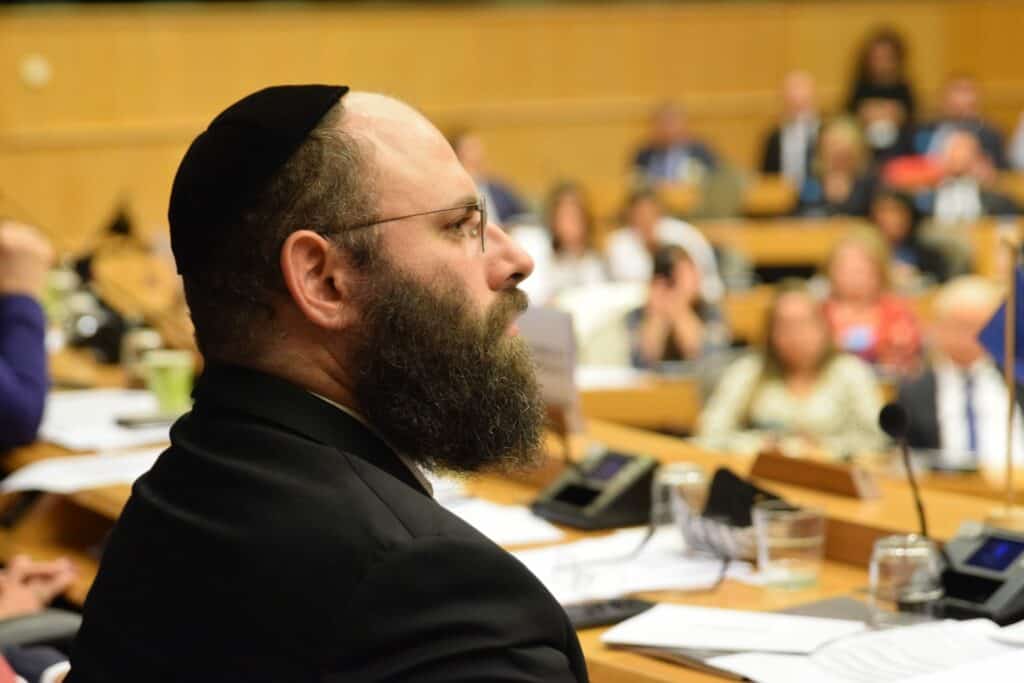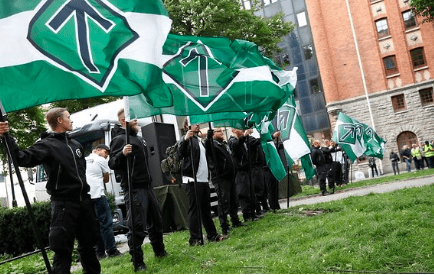Date: 15 May 2023
Immediate Release
EUROPEAN JEWISH LEADERS CONFERENCE IN PORTO.
THE MESSAGE IS CLEAR:
ANTISEMITISM IS UNIQUE AND MUST BE SEPARATED IN NATIONAL PLANS FROM OTHER FORMS OF HATE – CALLS ON OTHER JEWISH GROUPS TO REJECT “INTERSECTIONALITY” DUE TO ZIONIST EXCLUSION AND LACK OF ANY SOLIDARITY WITH JEWS
In resolution Jewish Leaders call on Israeli Politicians to rise above differences and to remember that all of Israel are responsible for each other, as well as for legislation that bars EU politicians with avowed antisemitic positions from office.
Israel’s Minister of Diaspora Affairs and Combatting Antisemitism, Amichai Chikli fires up delegates in message:
“In times of tension here in the Middle East, the Jews in the diaspora, whether it’s Europe or the States, unfortunately, are suffering as well. We are working constantly to make sure that every community will be protected…We are also witnessing troubling trends like the intention of the European Students Union to embrace the BDS movement- this is very bothersome to us, and we are afraid that this will hurt Jewish students who study on different campuses across Europe. Against these threats and many more, we will have to work together, determined and wisely. We must pay close attention – the campaign against the BDS movement and the New Antisemitism should be addressed as a WAR. There is no place for despair or giving in.”
European Jewish Association Chairman Rabbi Menachem Margolin, opening conference, says:
“How many people here have actually been asked by a government official or politician what a Jewish future should look like, or what should be in any plan? Not nearly enough. We must change this. Right now, as we meet, governments across Europe are coming forward with plans affecting Jewish life in Europe. We must ask ourselves what kind of future we want to see? And what part all of us can do to make that vision a reality? We are one community undivided by borders, when we speak with one voice, we are stronger together.”
European Commission Vice-President, Mr Margaritis Schinas praised EJA for its contribution to make Jewish life viable and ensuring the prosperity of European Jewry and noted that:
“Anti-Semitism is on the rise and unfortunately, Jewish institutions across the continent are required to invest more and more in security. The data shows that approximately 38% of the Jews in Europe are considering leaving Europe because they feel unsafe. This is a shame and it’s the responsibility of every government in the EU to protect its Jewish citizens.”
Schinas noted that 19 EU governments have so far released national action plans to combat antisemitism and stressed that “Europe strives in its diversity,”
World Zionist Organisation Head of Department for combatting antisemitism Raheli Baratz-Rix said, “Antisemitism is not a new term, but a term that reinvents itself. Antisemitism is familiar to us from history; however, it is still very present in our lives and continuously adjusts itself to current events. Even today there are rising voices not only from marginalized groups, but also from major groups in the global public, that threaten to take over the discourse and public space. We refuse to forget what can happen and where it can lead to, therefore we must not provide these groups any platform”
Gabriel Senderowicz , President of Jewish Community of Oporto:
“Many European governments confuse Jewish life with Jewish heritage. They think of Judaism as ancient houses that have been rehabilitated and some municipal museums that open on Shabbat. I am honored to be president of a community that has synagogues that respect traditional Judaism, that has kosher restaurants, films of history, a Jewish museum closed on Shabbat, and a Holocaust Museum that welcomes 50,000 children a year and teaches them that the aim of the Final Solution was to exterminate the Jews and not minorities in general.”
(Porto 15 May 2023) The European Jewish Association Annual Conference “Shaping the Future of European Jewry Together” begins today in Porto, Portugal. In partnership with the Jewish Community of Porto and the influential EMIH community of Hungary headed up by Rabbi Shlomo Koves, the conference gathers over a hundred Presidents and Board Members of Jewish Communities across Europe, and the participation of government and regional special envoys for Combatting Antisemitism.
The two-day Conference included: panel discussions on the national plans for combatting antisemitism that are starting to come forwards, online hate, a new youth leaders programme for campus activity and youth experiences of hate, ending the trade in Nazi memorabilia, bringing forwards a women’s leadership forum, and more.
Other notable figures addressing the conference included: European Commission Vice-President Margaritis Schinas, The General Secretary of the French Inter-ministerial delegation for the fight against racism and antisemitism, Mrs Elise Fajgeles, the Personal Representative of Chairman in Office on Combatting antisemitism OSCE Rabbi Andrew Baker, Chair of the Woman’s Impact Forum at the World Jewish Congress, Ruth Wasserman Lande, World Zionist Organisation Head of Department for combatting antisemitism Raheli Baratz-Rix, and the CEO of NGO Monitor Prof. Gerald Steinberg.
The Conference also took in a Jewish tour of Porto and delegates took part in a remembrance service for those that perished in the Inquisition.
The Conference culminated in a resolution, passed by vote in a show of hands, that will be forwarded to governments across Europe and to the Leadership of the European Union Institutions. The Resolution states that antisemitism is a unique and must the separated in national plans from other forms of hate, it calls on other Jewish organisations to reject “intersectionality” due to Zionist exclusion and a lack of solidarity with Jews. In the resolution the Jewish Leaders also called on Israeli Politicians to rise above differences and to remember that all of Israel are responsible for each other, and finally urged governments for legislation that bars from office EU politicians with avowed antisemitic positions.
Rabbi Shlomo Koves, President of EMIH in Hungary, who partnered with the EJA and Jewish Community in Porto and whose own efforts in Hungary have seen a renaissance of Jewish life and Institutions in Budapest and the country as a whole, added: “As years go by after the Holocaust, some social and political movements in Europe may want to forget it and say that antisemitism is just another kind of hatred, nothing unique about it. This is a dangerous attitude for the future of the Jewish community in Europe. Antisemitism is a unique and insidious form of hate that requires separate attention and action from other forms of prejudice. While we stand in solidarity with all those who fight against hate, we cannot allow our struggle against antisemitism to be subsumed within broader ‘intersectional’ movements that fail to acknowledge the unique and specific nature of anti-Jewish bias or reject our connection to Zionism. At the same time, Jewish communities across Europe must come together to shape our own future and demand action from our governments and EU leadership. We need to work in solidarity to ensure the safety and flourishing of our communities, and to make clear that antisemitism has no place in our societies.”
Elise Fajgeles – General Secretary Inter- Ministerial delegation for the fight against racism and anti-Semitism (DILCRAH): “France faces anti-Semitism from both the far-right and the far-left. Anti-Semitism on the far-left is the most visible and vocal. But on the far-right that pretend to defend Jews against Islamic Antisemitism, prominent political figures want to ban ritual slaughter that will eventually prevent Jews to practice their own religion and consequently question their vey future in France. We are focusing our efforts on both prevention and repression of Antisemitism. We are funding more than 90 associations that are engaged against racism and Antisemitism. We are working with the teachers to raise the issue of Antisemitism, educate them about it and give them the tools to fight it in schools when French Jews must face Antisemitism. We are also working with universities. We have created a network of referents educated and trained against Antisemitism in every university to organise conferences about it and refer to the French state when antisemitic acts are committed against Jews in universities. We have banned associations and groups who propagates Antisemitism, from ultra-right to Islamist organizations and radical mosques and we also are much aware of the fact that anti-Zionism is the reinvented modern form of Antisemitism.”
Pedro Bacelar de Vasconcelos, Coordinator antisemitism of Portugal: We are prepared for with guidelines on fighting antisemitism and promoting Jewish life. Antisemitism is not only hate speech. Speaking about it means awareness of Holocaust.
Chief Rabbi of the Netherlands,Rabbi Binyomin Jacobs: The 80% of Dutch Jews who were killed in the Holocaust lost their voice. Before the war, Jews were integrated in Holland; not assimilated, but integrated. There were many Jewish communities all over Holland. Now there is a serious need for restitution. In Holland nowadays there is anti-Zionism and it’s exactly the same thing as anti-Semitism. It’s a virus. It’s a political issue. Left-wing parties don’t want to talk about it though. That creates a lot of anti-Semitism.
Edward Odoner Chairman of the Review Board, TSKZ (Poland): The Jewish community in Poland doesn’t feel antisemitism on a daily basis. That’s why the Polish government has no problem to not have a plan to combat antisemitism. But this doesn’t mean that there are no antisemites in the country. This also why Poland has bad press because people think it
has no action against antisemitism. Poland just commemorated the 80th anniversary of the Warsaw Ghetto uprising and this was the initiative of the Polish government and President.
Ellen Van Praagh – Chair IPOR (Netherlands): Every time they talk about Palestinians, they ignore the position of Dutch Jews. Many Dutch Jews are leaving to Israel, the US, and anywhere else. We have some political parties that are openly antisemitic and don’t believe in the existence of the State of Israel. We have been living in the Netherlands for many generations and this is our home.
Ruth Wasserman Lande, Chair of Women’s Impact Forum, World Jewish
Congress (WJC): When I lived in Cairo it was obvious that it was difficult as a Jew, as an Israeli, to deal with the inherent misconceptions and antagonism. In Boston I expected something very different, however I met people who were afraid of the Holocaust coming back. I now understand the sentiment of those Jewish people in Boston. It’s obvious why that was the case, as anti-Semitism is on the rise. We need to bring it home to the Israelis, just how amazing it is to have both religious and secular people here together. We should work on operatively building these ties – as Israelis are part of us, and we are part of them. This is our strength.














